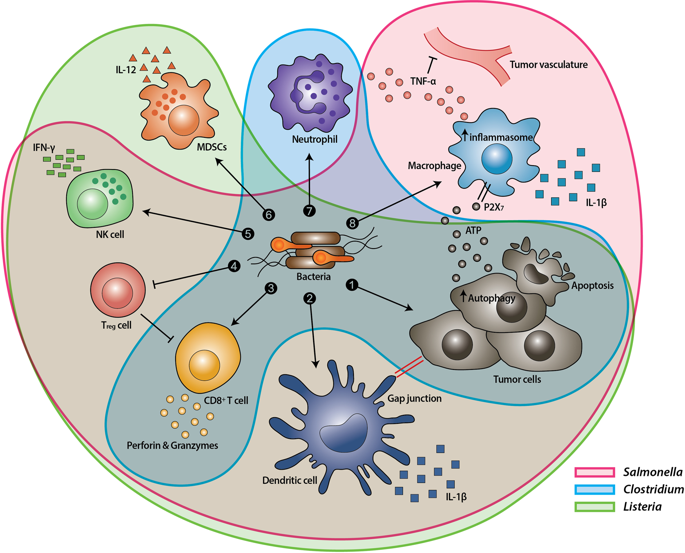当前位置:
X-MOL 学术
›
Exp. Mol. Med.
›
论文详情
Our official English website, www.x-mol.net, welcomes your
feedback! (Note: you will need to create a separate account there.)
Bacteria-cancer interactions: bacteria-based cancer therapy.
Experimental & Molecular Medicine ( IF 9.5 ) Pub Date : 2019-12-11 , DOI: 10.1038/s12276-019-0297-0 Mai Thi-Quynh Duong 1, 2 , Yeshan Qin 1, 2 , Sung-Hwan You 1, 3 , Jung-Joon Min 1, 2, 3
Experimental & Molecular Medicine ( IF 9.5 ) Pub Date : 2019-12-11 , DOI: 10.1038/s12276-019-0297-0 Mai Thi-Quynh Duong 1, 2 , Yeshan Qin 1, 2 , Sung-Hwan You 1, 3 , Jung-Joon Min 1, 2, 3
Affiliation

|
Recent advances in cancer therapeutics, such as targeted therapy and immunotherapy, have raised the hope for cures for many cancer types. However, there are still ongoing challenges to the pursuit of novel therapeutic approaches, including high toxicity to normal tissue and cells, difficulties in treating deep tumor tissue, and the possibility of drug resistance in tumor cells. The use of live tumor-targeting bacteria provides a unique therapeutic option that meets these challenges. Compared with most other therapeutics, tumor-targeting bacteria have versatile capabilities for suppressing cancer. Bacteria preferentially accumulate and proliferate within tumors, where they can initiate antitumor immune responses. Bacteria can be further programmed via simple genetic manipulation or sophisticated synthetic bioengineering to produce and deliver anticancer agents based on clinical needs. Therapeutic approaches using live tumor-targeting bacteria can be applied either as a monotherapy or in combination with other anticancer therapies to achieve better clinical outcomes. In this review, we introduce and summarize the potential benefits and challenges of this anticancer approach. We further discuss how live bacteria interact with tumor microenvironments to induce tumor regression. We also provide examples of different methods for engineering bacteria to improve efficacy and safety. Finally, we introduce past and ongoing clinical trials involving tumor-targeting bacteria.
中文翻译:

细菌-癌症相互作用:基于细菌的癌症治疗。
癌症治疗的最新进展,如靶向治疗和免疫治疗,为治愈许多癌症类型带来了希望。然而,寻求新的治疗方法仍然存在挑战,包括对正常组织和细胞的高毒性、治疗深部肿瘤组织的困难以及肿瘤细胞耐药的可能性。使用活的肿瘤靶向细菌提供了一种独特的治疗选择来应对这些挑战。与大多数其他疗法相比,靶向肿瘤的细菌具有多种抑制癌症的能力。细菌优先在肿瘤内积聚和增殖,在那里它们可以引发抗肿瘤免疫反应。可以通过简单的基因操作或复杂的合成生物工程对细菌进行进一步编程,以根据临床需求生产和递送抗癌剂。使用活的肿瘤靶向细菌的治疗方法可以作为单一疗法或与其他抗癌疗法结合使用,以获得更好的临床结果。在这篇综述中,我们介绍并总结了这种抗癌方法的潜在好处和挑战。我们进一步讨论了活细菌如何与肿瘤微环境相互作用以诱导肿瘤消退。我们还提供了工程细菌以提高功效和安全性的不同方法的示例。最后,我们介绍了过去和正在进行的涉及肿瘤靶向细菌的临床试验。使用活的肿瘤靶向细菌的治疗方法可以作为单一疗法或与其他抗癌疗法结合使用,以获得更好的临床结果。在这篇综述中,我们介绍并总结了这种抗癌方法的潜在好处和挑战。我们进一步讨论了活细菌如何与肿瘤微环境相互作用以诱导肿瘤消退。我们还提供了工程细菌以提高功效和安全性的不同方法的示例。最后,我们介绍了过去和正在进行的涉及肿瘤靶向细菌的临床试验。使用活的肿瘤靶向细菌的治疗方法可以作为单一疗法或与其他抗癌疗法结合使用,以获得更好的临床结果。在这篇综述中,我们介绍并总结了这种抗癌方法的潜在好处和挑战。我们进一步讨论了活细菌如何与肿瘤微环境相互作用以诱导肿瘤消退。我们还提供了工程细菌以提高功效和安全性的不同方法的示例。最后,我们介绍了过去和正在进行的涉及肿瘤靶向细菌的临床试验。我们进一步讨论了活细菌如何与肿瘤微环境相互作用以诱导肿瘤消退。我们还提供了工程细菌以提高功效和安全性的不同方法的示例。最后,我们介绍了过去和正在进行的涉及肿瘤靶向细菌的临床试验。我们进一步讨论了活细菌如何与肿瘤微环境相互作用以诱导肿瘤消退。我们还提供了工程细菌以提高功效和安全性的不同方法的示例。最后,我们介绍了过去和正在进行的涉及肿瘤靶向细菌的临床试验。
更新日期:2019-12-11
中文翻译:

细菌-癌症相互作用:基于细菌的癌症治疗。
癌症治疗的最新进展,如靶向治疗和免疫治疗,为治愈许多癌症类型带来了希望。然而,寻求新的治疗方法仍然存在挑战,包括对正常组织和细胞的高毒性、治疗深部肿瘤组织的困难以及肿瘤细胞耐药的可能性。使用活的肿瘤靶向细菌提供了一种独特的治疗选择来应对这些挑战。与大多数其他疗法相比,靶向肿瘤的细菌具有多种抑制癌症的能力。细菌优先在肿瘤内积聚和增殖,在那里它们可以引发抗肿瘤免疫反应。可以通过简单的基因操作或复杂的合成生物工程对细菌进行进一步编程,以根据临床需求生产和递送抗癌剂。使用活的肿瘤靶向细菌的治疗方法可以作为单一疗法或与其他抗癌疗法结合使用,以获得更好的临床结果。在这篇综述中,我们介绍并总结了这种抗癌方法的潜在好处和挑战。我们进一步讨论了活细菌如何与肿瘤微环境相互作用以诱导肿瘤消退。我们还提供了工程细菌以提高功效和安全性的不同方法的示例。最后,我们介绍了过去和正在进行的涉及肿瘤靶向细菌的临床试验。使用活的肿瘤靶向细菌的治疗方法可以作为单一疗法或与其他抗癌疗法结合使用,以获得更好的临床结果。在这篇综述中,我们介绍并总结了这种抗癌方法的潜在好处和挑战。我们进一步讨论了活细菌如何与肿瘤微环境相互作用以诱导肿瘤消退。我们还提供了工程细菌以提高功效和安全性的不同方法的示例。最后,我们介绍了过去和正在进行的涉及肿瘤靶向细菌的临床试验。使用活的肿瘤靶向细菌的治疗方法可以作为单一疗法或与其他抗癌疗法结合使用,以获得更好的临床结果。在这篇综述中,我们介绍并总结了这种抗癌方法的潜在好处和挑战。我们进一步讨论了活细菌如何与肿瘤微环境相互作用以诱导肿瘤消退。我们还提供了工程细菌以提高功效和安全性的不同方法的示例。最后,我们介绍了过去和正在进行的涉及肿瘤靶向细菌的临床试验。我们进一步讨论了活细菌如何与肿瘤微环境相互作用以诱导肿瘤消退。我们还提供了工程细菌以提高功效和安全性的不同方法的示例。最后,我们介绍了过去和正在进行的涉及肿瘤靶向细菌的临床试验。我们进一步讨论了活细菌如何与肿瘤微环境相互作用以诱导肿瘤消退。我们还提供了工程细菌以提高功效和安全性的不同方法的示例。最后,我们介绍了过去和正在进行的涉及肿瘤靶向细菌的临床试验。






























 京公网安备 11010802027423号
京公网安备 11010802027423号